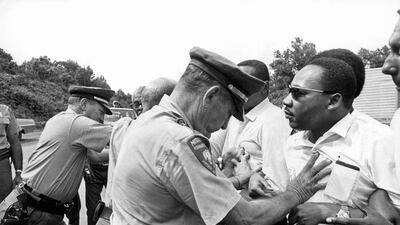King in the Wilderness, the HBO documentary that chronicles the final life struggles of Martin Luther King, Jr, brings to mind an African proverb that says if the surviving lions don’t tell their stories, the hunters will get all the credit.
What emerges over two hours is not only a valuable historical film treasure – which debuts on Sunday on OSN – but a gathering of the “lions” who lived, breathed, marched, collaborated and stood loyally by the civil rights leader’s side to the bitter end. Their in-the-trenches testimony and magnificent memories bring the man alive to modern audiences like never before.
“When I tell people we’re doing a film on Martin Luther King, Jr, everyone kind of rolls their eyes because they think there’ve been so many of them. They think they’ve seen it all,” says director Peter Kunhardt, whose HBO credits include Nixon by Nixon: In His Own Words and the Emmy-winning Jim: The James Foley Story.
“What it really comes down to is that they’ve had the I Have a Dream speech so many times they don’t want to see it again. So we didn’t want to show that early period of King. We wanted to show King the man as a true human being and the struggles he went through.”
King’s leadership during the bus boycotts, the sit-ins and the Selma-to-Montgomery marches is now legendary – but their aftermath, the last three years of his life, is seldom discussed.
On the advice of scholars, Kunhardt focuses on this era of the Baptist minister and activist’s life – from the passing of the Voting Rights Act in 1965 to his assassination in Memphis, Tennessee, on April 4, 1968 – “when his greatest trials and tribulations were happening. He was really put to the test”.
Inspired by Mahatma Gandhi, King’s unshakeable commitment to nonviolence, in the face of an increasingly unstable country, saw his dream, in his own words, “turned into a nightmare” as daunting new obstacles blocked his path.
“We were trying to redeem the soul of America from the triple evils of racism, war and poverty, and Martin had become far more exposed to enemies by taking on both civil rights and the war issue,” says politician and diplomat Andrew Young, who was a confidant to King and executive director of the Southern Christian Leadership Conference (SCLC).
King in the Wilderness achieves a balancing act of storytelling because it not only reveals the philosophical conflicts of a leader who faced an onslaught of criticism from both sides of the political spectrum, but also of the humble co-pastor of Ebenezer Baptist Church and father of four who did his best to eat dinner with his family, often at the insistence of his fellow activist wife Coretta Scott King, who died in 2006.
In Washington, meanwhile, his civil rights ally, President Lyndon Johnson, regarded King’s anti-Vietnam War speeches as irresponsible.
Also during this period, when King and his SCLC allies headed to northern cities such as Chicago in response to race riots – to march through white neighbourhoods in support of open housing and to put an end to slums – he was emotionally hammered by one of the most violent, hate-filled responses he encountered.
“Chicago was a huge awakening for him,” says singer Harry Belafonte, who often hosted King in New York, and recalls how physically and emotionally drained his friend had become after facing this new kind of white aggression in the North.
Xernona Clayton, his friend and SCLC organiser, believes King’s heart was broken by this darker turn of events in America. “It had bothered him deeply that the nation had turned against him.”
Clayton, who drove King to the airport for his final trip to Memphis, also recalls the scene of his two young sons, Martin and Dexter, jumping on the bonnet of her car in the driveway, begging their dad not to go that day.
Young remembers King as “the happiest I had seen him in a long time” on the morning of April 4.
“He always blamed himself for not doing enough. He was driven by a kind of a need for perfection. He was always feeling that he wasn’t doing his best I think because of his feeling that somehow he wasn’t good enough to be the leader. Those were periods when he was really just physically exhausted.”
King in the Wilderness broadcasts at 11pm Sunday on OSN First HD Home of HBO.

